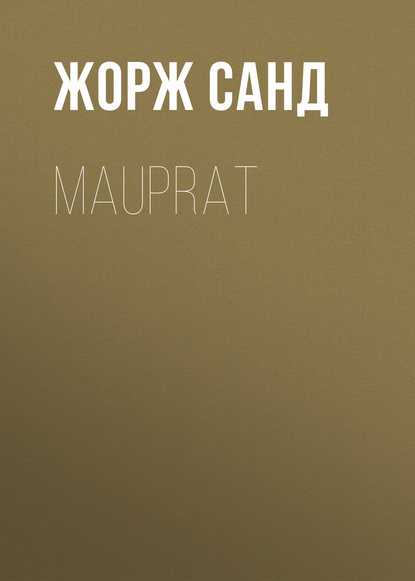По всем вопросам обращайтесь на: info@litportal.ru
(©) 2003-2025.
✖
Mauprat
Настройки чтения
Размер шрифта
Высота строк
Поля
“And yet honour and life are of some importance at your age,” replied the abbe, visibly irritated, but feigning a suaver manner than ever. “Who knows into what folly religious fervour may lead the Trappist? For, between ourselves be it said, my child – you see, I am a man of moderation – I knew the world in my youth, and I do not approve of these violent resolves, which are more often dictated by pride than piety. For instance, I have consented to temper the austerity of our rules; my friars look well-fed, and they wear shirts. Rest assured, my good sir, I am far from approving of your uncle’s design, and I shall do all that is possible to hinder it. Yet, if he still persists, how will my efforts profit you? He has obtained his superior’s permission, and may, after all, yield to his fatal inspiration. You may be seriously compromised by an affair of this kind; for, although reports say that you are a worthy young gentleman, though you have abjured the errors of the past, and though, perhaps, your soul has always hated iniquity, you have certainly been involved in many misdeeds which human laws condemn and punish. Who can tell into what involuntary revelations Brother Nepomucene may find himself drawn if he sets in motion the machinery of criminal proceedings? Can he set it in motion against himself without at the same time setting it in motion against you? Believe me, I wish for peace – I am a kindly man.”
“Yes, a very kindly man, father,” I answered, in a tone of irony. “I see that perfectly. But do not let this matter cause you needless anxiety; for there is one very clear argument which must reassure both of us. If a veritable religious impulse urges Brother John the Trappist to make a public reparation, it will be easy to make him understand that he ought to hesitate before he drags another than himself into the abyss; the spirit of Christ forbids him to do this. But, if the truth is, as I presume, that M. Jean de Mauprat has not the least wish to hand himself over to justice, his threats are but little calculated to terrify me, and I shall take steps to prevent them from making more stir than is desirable.”
“So that is the only answer I am to give him?” asked the prior, darting a vindictive glance at me.
“Yes, sir,” I replied; “unless he would prefer to come here and receive the answer from my own mouth. I came with a determination to conquer the disgust which his presence arouses in me; and I am astonished that, after expressing so much eagerness to see me, he should remain in the background when I arrive.”
“Sir,” answered the prior, with ridiculous majesty, “my duty is to see that the peace of our Lord reigns in this holy place. I must, therefore, set myself against any interview which might lead to violent explanations.”
“You are much too easily frightened, sir,” I replied. “There is nothing to arouse passion in this matter. However, as it was not I who called for these explanations, and as I came here out of pure compliance, I most willingly refrain from pushing them further, and I thank you for having been good enough to act as intermediary.”
With that, I made a profound bow and retired.
XX
I gave an account of this interview to the abbe, who was waiting for me at Patience’s. He was entirely of my own opinion; he thought, like myself, that the prior, so far from endeavouring to turn the Trappist from his pretended designs, was trying with all his power to frighten me, in the hope that I should be brought to make considerable sacrifices of money. In his eyes it was clear that this old man, faithful to the monkish spirit, wished to put into the hands of a clerical Mauprat the fruit of the labours and thrift of a lay Mauprat.
“That is the indelible mark of the Catholic clergy,” he said. “They cannot live without waging war on the families around them, and being ever on the watch for opportunities to spoil them. They look upon this wealth as their property, and upon all ways of recovering it as lawful. It is not as easy as you think to protect one’s self against this smooth-faced brigandage. Monks have stubborn appetites and ingenious minds. Act with caution and be prepared for anything. You can never induce a Trappist to show fight. Under the shelter of his hood, with head bowed and hands crossed, he will accept the cruelest outrages; and, knowing quite well that you will not assassinate him, he will hardly fear you. Again, you do not know what justice can become in man’s hands, and how a criminal trial is conducted and decided when one of the parties will not stick at any kind of bribery and intimidation. The Church is powerful, the law grandiloquent. The words ‘honesty’ and ‘integrity’ have for centuries been ringing against the hardened walls of courts of justice; but that has not prevented judges from being false or verdicts from being iniquitous. Have a care; have a care! The Trappist may start the cowled pack on his own track and throw them off by disappearing at the right point and leading them on yours. Remember that you have wounded many an amour propre by disappointing the pretensions of the dowry-hunters. One of the most incensed of them, and at the same time one of the most malicious, is a near relative of a magistrate who is all-powerful in the province. De la Marche has given up the gown for the sword; but among his old colleagues he may have left some one who would like to do you an ill-turn. I am sorry you were not able to join him in America, and get on good terms with him. Do not shrug your shoulders; you may kill a dozen of them, and things will go from bad to worse. They will avenge themselves; not on your life, perhaps, for they know that you hold that cheap, but on your honour; and your great-uncle will die of grief. In short – ”
“My dear abbe,” I said, interrupting him, “you have a habit of seeing everything black at the first glance, when you do not happen to see the sun in the middle of the night. Now let me tell you some things which ought to drive out these gloomy presentiments. I know John Mauprat of old; he is a signal impostor, and, moreover, the rankest of cowards. He will sink into the earth at the sight of me, and as soon as I speak I will make him confess that he is neither Trappist, nor monk, nor saint. All this is a mere sharper’s trick. In the old days I have heard him making plans which prevent me from being astonished at his impudence now; so I have but little fear of him.”
“There you are wrong,” replied the abbe. “You should always fear a coward, because he strikes from behind while you are expecting him in front. If John Mauprat were not a Trappist, if the papers he showed me were lies, the prior of the Carmelites is too shrewd and cautious to have let himself be deceived. Never would he have espoused the cause of a layman, and never would he mistake a layman for one of his own cloth. However, we must make inquiries; I will write to the superior of the Trappist monastery at once, but I am certain he will confirm what I know already. It is even possible that John Mauprat is a genuine devotee. Nothing becomes such a character better than certain shades of the Catholic spirit. The inquisition is the soul of the Church, and the inquisition should smile on John Mauprat. I firmly believe that he would give himself up to the sword of justice solely for the pleasure of compassing your ruin with his own, and that the desire to found a monastery with your money is a sudden inspiration, the honour of which belongs entirely to the prior of the Carmelites.”
“That is hardly probable, my dear abbe,” I said. “Besides, where can these discussions lead us? Let us act. Let us keep the chevalier in sight, so that the unclean beast may not come and poison the calm of his last days. Write to the Trappist superior; I will offer the creature a pension, and when he comes, let us carefully watch his slightest movements. My sergeant, Marcasse, is an admirable bloodhound. Let us put him on the track, and if he can manage to tell us in vulgar speech what he has seen and heard, we shall soon know everything that is happening in the province.”
Chatting thus, we arrived at the chateau towards the close of day. As I entered the silent building, I was seized with a fond, childish uneasiness, such as may come upon a mother when she leaves her babe a moment. The eternal security which nothing had ever disturbed within the bounds of the old sacred walls, the decrepitude of the servants, the way in which the doors always stood open, so that beggars would sometimes enter the drawing-room without meeting any one and without giving umbrage – the whole atmosphere of peace and trust and isolation – formed a strange contrast to the thoughts of strife, and the cares with which John’s return and the prior’s threats had filled my mind for some hours. I quickened my pace, and, seized with an involuntary trembling, I crossed the billiard-room. At that moment I thought I saw a dark shadow pass under the windows of the ground floor, glide through the jasmines, and disappear in the twilight. I threw open the door of the drawing-room and stood still. There was not a sound, not a movement. I was going to look for Edmee in her father’s room, when I thought I saw something white moving near the chimney-corner where the chevalier always sat.
“Edmee! Is that you?” I exclaimed.
No one answered. My brow was covered with a cold sweat and my knees were trembling. Ashamed of this strange weakness, I rushed towards the hearth, repeating Edmee’s name in agonized tones.
“Have you come at last, Bernard?” she replied, in a trembling voice.
I seized her in my arms. She was kneeling beside her father’s arm-chair and pressing to her lips the old man’s icy hands.
“Great God!” I cried, when by the dim light in the room I could distinguish the chevalier’s livid face. “Is our father dead?”
“Perhaps,” she said, in a stifled voice; “perhaps he has only fainted, please God! But, a light, for Heaven’s sake! Ring the bell! He has only been in this state for a moment.”
I rang in all haste. The abbe now came in, and fortunately we succeeded in bringing my uncle back to life.
But when he opened his eyes, his mind seemed to be struggling against the impressions of a fearful dream.
“Has he gone? Has the vile phantom gone?” he repeated several times. “Ho, there, Saint-Jean! My pistols! Now, my men! Throw the fellow out of the window!”
I began to suspect the truth.
“What has happened?” I said the Edmee, in a low tone. “Who has been here in my absence?”
“If I told you,” answered Edmee, “you would hardly believe it. You would think my father and I were mad. But I will tell you everything presently; let us attend to him.”
With her soft words and loving attentions she succeeded in calming the old man. We carried him to his room, and he fell into a quiet sleep. When Edmee had gently withdrawn her hand from his and lowered the wadded curtain over his head, she joined the abbe and myself, and told us that a quarter of an hour before we returned a mendicant friar had entered the drawing-room, where, as usual, she was embroidering near her father, who had fallen asleep. Feeling no surprise at an incident which frequently happened, she had risen to get her purse from the mantel-piece, at the same time addressing a few words to the monk. But just as she was turning round to offer him an alms the chevalier had awakened with a start, and eyeing the monk from head to foot, had cried in a tone half of anger and half of fear:
“What the devil are you doing here in that garb?”
Thereupon Edmee had looked at the monk’s face and had recognised.
“A man you would never dream of,” she said; “the frightful John Mauprat. I had only seen him a single hour in my life, but that repulsive face has never left my memory, and I have never had the slightest attack of fever without seeing it again. I could not repress a cry.
“‘Do not be afraid,’ he said, with a hideous smile. ‘I come here not as an enemy, but as a supplicant.’
“And he went down on his knees so near my father, that, not knowing what he might do, I rushed between them, and hastily pushed back the arm-chair to the wall. Then the monk, speaking in a mournful tone, which was rendered still more terrifying by the approach of night, began to pour out some lamentable rigmarole of a confession, and ended by asking pardon for his crimes, and declaring that he was already covered by the black veil which parricides wear when they go to the scaffold.
“‘This wretched creature has gone mad,’ said my father, pulling the bell-rope.
“But Saint-Jean is deaf, and he did not come. So we had to sit in unspeakable agony and listen to the strange talk of the man who calls himself a Trappist and declares that he had come to give himself up to justice in expiation of his transgressions. Before doing so, he wished to implore my father’s forgiveness and his last blessing. While saying this he was moving forward on his knees, and speaking with an intense passion. In the sound of this voice, uttering words of extravagant humility, there seemed to be insult and a menace. As he continued moving nearer to my father, and as the idea of the foul caresses which he apparently wished to lavish on him filled me with disgust, I ordered him in a somewhat imperious tone to rise and speak becomingly. My father angrily ordered him to say no more and depart; and as at this moment he cried, ‘No, you must let me clasp your knees!’ I pushed him back to prevent him from touching my father. I shudder to think that my glove has touched that unclean gown. He turned towards me, and, though he still feigned penitence and humility, I could see rage gleaming in his eyes. My father made a violent effort to get up, and in fact he got up, as if by a miracle; but the next instant he fell back fainting in his chair. Then steps were heard in the billiard-room, and the monk rushed out by the glass door with the speed of lightning. It was then that you found me half-dead and frozen with terror at the feet of my prostate father.”
“The abominable coward has lost no time, you see, abbe,” I cried. “His aim was to frighten the chevalier and Edmee, and he has succeeded; but he reckoned without me, and I swear that – though he should have to be treated in the Roche-Mauprat fashion – if he ever dares to come here again – ”
“That is enough, Bernard,” said Edmee. “You make me shudder. Speak seriously, and tell me what all this means.”
When I had informed her of what had happened to the abbe and myself, she blamed us for not warning her.
“Had I known,” she said, “what to expect I should not have been frightened, and I could have taken care never to be left alone in the house with my father, and Saint-Jean, who is hardly more active. Now, however, I am no longer afraid; I shall be on my guard. But the best thing, Bernard dear, is to avoid all contact with this loathsome man, and to make him as liberal an allowance as possible to get rid of him. The abbe is right; he may prove formidable. He knows that our kinship with him must always prevent us from summoning the law to protect us against his persecutions; and though he cannot injure us as seriously as he flatters himself, he can at least cause us a thousand annoyances, which I am reluctant to face. Throw him gold and let him take himself off. But do not leave me again, Bernard; you see you have become absolutely necessary to me; brood no more over the wrong you pretend to have done me.”
I pressed her hand in mine, and vowed never to leave her, though she herself should order me, until this Trappist had freed the country from his presence.
The abbe undertook the negotiations with the monastery. He went into the town the following day, carrying from me a special message to the Trappist that I would throw him out of the window if he ever took it into his head to appear at Sainte-Severe again. At the same time I proposed to supply him with money, even liberally, on condition that he would immediately withdraw to his convent or to any other secular or religious retreat he might choose, and that he would never again set foot in Berry.
The prior received the abbe with all the signs of profound contempt and holy aversion for his state of heresy. Far from attempting to wheedle him like myself, he told him that he wished to have nothing to do with this business, that he washed his hands of it, and that he would confine himself to conveying the decisions on both sides, and affording a refuge to Brother Nepomucene, partly out of Christian charity, and partly to edify his monks by the example of a truly devout man. According to him, Brother Nepomucene would be the second of that name placed in the front rank of the heavenly host by virtue of the canons of the Church.
The next day the abbe was summoned to the convent by a special messenger, and had an interview with the Trappist. To his great surprise, he found that the enemy had changed his tactics. He indignantly refused help of any sort, declaring that his vow of poverty and humility would not allow it; and he strongly blamed his dear host, the prior, for daring to suggest, without his consent, an exchange of things eternal for things temporal. On other matters he refused to explain his views, and took refuge in ambiguous and bombastic replies. God would inspire him, he said, and at the approaching festival of the Virgin, at the august and sublime hour of holy communion, he expected to hear the voice of Jesus speaking to his heart and announcing the line of conduct he ought to follow. The abbe was afraid of betraying uneasiness, if he insisted on probing this “Christian mystery,” so he returned with this answer, which was least of all calculated to reassure me. He did not appear again either at the castle or in the neighbourhood, and kept himself so closely shut up in the convent that few people ever saw his face. However, it soon became known, and the prior was most active in spreading the news, that John Mauprat had been converted to the most zealous and exemplary piety, and was now staying at the Carmelite convent for a term, as a penitent from La Trappe. Every day they reported some fresh virtuous trait, some new act of austerity of this holy personage. Devotees, with a thirst for the marvellous, came to see him, and brought him a thousand little presents, which he obstinately refused. At times he would hide so well that people said he had returned to his monastery; but just as we were congratulating ourselves on getting rid of him, we would hear that he had recently inflicted some terrible mortifications on himself in sackcloth and ashes; or else that he had gone barefooted on a pilgrimage into some of the wildest and most desolate parts of Varenne. People went so far as to say that he could work miracles. If the prior had not been cured of his gout, that was because, in a spirit of true penitence, he did not wish to be cured.
This state of uncertainty lasted almost two months.
XXI
These days, passed in Edmee’s presence, were for me days of delight, yet of suffering. To see her at all hours, without fear of being indiscreet, since she herself would summon me to her side, to read to her, talk with her on all subjects, share the loving attentions she bestowed on her father, enter into half her life exactly as if we had been brother and sister – this was great happiness, no doubt, but it was a dangerous happiness, and again the volcano kindled in my breast. A few confused words, a few troubled glances betrayed me. Edmee was by no means blind, but she was impenetrable; her dark and searching eyes, fixed on me as on her father, with the solicitude of an absorbing affection, would at times suddenly grow cold, just as the violence of my passion was ready to break out. Her countenance would then express nothing but patient curiosity and an unswerving resolve to read to the bottom of my soul without letting me see even the surface of her own.
My sufferings, though acute, were dear to me at first; it pleased me to think that I was secretly offering them to Edmee as an expiation of my past faults. I hoped that she would perceive this and be satisfied with me. She saw it, and said nothing. My agony grew more intense; but still some days passed before I lost all power to hide it. I say days, because whoever has loved a woman, and has been much alone with her, yet always kept in check by her severity, must have found days like centuries. How full life seemed and yet how consuming! What languor and unrest! What tenderness and rage! It was as though the hours were years; and at this very day, if I did not bring in dates to rectify the error of my memory, I could easily persuade myself that these two months filled half my life.
Perhaps, too, I should like to persuade myself of this, in order to find some excuse for the foolish and culpable conduct into which I fell in spite of all the good resolutions which I had but lately formed. The relapse was so sudden and complete that I should still blush at the thought, if I had not cruelly atoned for it, as you will soon see.
After a night of agony, I wrote her an insane letter which came nigh to producing terrible consequences for me; it was somewhat as follows:
“You do not love me, Edmee; you will never love me. I know this; I ask for nothing, I hope for nothing. I would only remain near you and consecrate my life to your service and defence. To be useful to you I will do all that my strength will allow; but I shall suffer, and, however I try to hide it, you will see it; and perhaps you will attribute to wrong causes the sadness I may not be able to suppress with uniform heroism. You pained me deeply yesterday, when you advised me to go out a little ‘to distract my thoughts.’ To distract my thoughts from you, Edmee! What bitter mockery! Do not be cruel, sister; for then you become my haughty betrothed of evil days again.. and, in spite of myself, I again become the brigand whom you used to hate… Ah, if you knew how unhappy I am! In me there are two men who are incessantly waging a war to the death. It is to be hoped that the brigand will fall; but he defends himself step by step, and he cries aloud because he feels himself covered with wounds and mortally stricken. If you knew, Edmee, if you only knew what struggles, what conflicts, rend my bosom; what tears of blood my heart distils; and what passions often rage in that part of my nature which the rebel angels rule! There are nights when I suffer so much that in the delirium of my dreams I seem to be plunging a dagger into your heart, and thus, by some sombre magic, to be forcing you to love me as I love you. When I awake, in a cold sweat, bewildered, beside myself, I feel tempted to go and kill you, so as to destroy the cause of my anguish. If I refrain from this, it is because I fear that I should love you dead with as much passion and tenacity as if you were alive. I am afraid of being restrained, governed, swayed by your image as I am by your person. Then, again, a man cannot destroy the being he loves and fears; for when she has ceased to exist on earth she still exists in himself. It is the lover’s soul which serves as a coffin for his mistress and which forever preserves her burning remains, that it may feed on them without ever consuming them. But, great Heaven! what is this tumult in my thoughts? You see, Edmee, to what an extent my mind is sick; take pity on me, then. Bear with me, let me be sad, never doubt my devotion. I am often mad, but I worship you always. A word, a look from you, will always recall me to a sense of duty, and this duty will be sweet when you deign to remind me of it. As I write to you, Edmee, the sky is full of clouds that are darker and heavier than lead; the thunder is rumbling, and doleful ghosts of purgatory seem to be floating in the glare of the lightning. The weight of the storm lies on my soul; my bewildered mind quivers like the flashes which leap from the firmament. It seems as if my whole being were about to burst like the tempest. Ah, could I but lift up to you a voice like unto its voice! Had I the power to lay bare the agonies and passions which rend me within! Often, when a storm has been sweeping over the great oaks above, you have told me that you enjoy gazing upon the fury of the one and the resistance of the other. This, you say, is a battle of mighty forces; and in the din in the air you fancy you can detect the curses of the north wind and the mournful cries of the venerable branches. Which suffers the more, Edmee, the tree which resists, or the wind which exhausts itself in the attack? Is it not always the wind that yields and falls? And then the sky, grieved at the defeat of her noble son, sheds a flood of tears upon the earth. You love these wild images, Edmee; and whenever you behold strength vanquished by resistance you smile cruelly, and there is a look in your inscrutable eyes that seems to insult my misery. Well, you have cast me to the ground, and, though shattered, I still suffer; yes, learn this, since you wish to know it, since you are merciless enough to question me and to feign compassion. I suffer, and I no longer try to remove the foot which the proud conqueror has placed on my broken heart.”
The rest of this letter, which was very long, very rambling and absurd from beginning to end, was in the same strain. It was not the first time that I had written to Edmee, though I lived under the same roof, and never left her except during the hours of rest. My passion possessed me to such a degree that I was irresistibly drawn to encroach upon my sleep in order to write to her, I could never feel that I had talked enough about her, that I had sufficiently renewed my promises of submission – a submission in which I was constantly failing. The present letter, however, was more daring and more passionate than any of the others. Perhaps, in some mysterious way, it was written under the influence of the storm which was rending the heavens while I, bent over my table, with moist brow and dry, burning hand, drew this frenzied picture of my sufferings. A great calm, akin to despair, seemed to come over me as I threw myself upon my bed after going down to the drawing-room and slipping my letter into Edmee’s work-basket. Day was breaking, and the horizon showed heavy with the dark wings of the storm, which was flying to other regions. The trees, laden with rain, were tossing under the breeze, which was still blowing freshly. Profoundly sad, but blindly resigned to my suffering, I fell asleep with a sense of relief, as if I had made a sacrifice of my life and hopes. Apparently Edmee did not find my letter, for she gave me no answer. She generally replied verbally, and these letters of mine were a means of drawing from her those professions of sisterly friendship with which I had perforce to be satisfied, and which, at least, poured soothing balm into my wound. I ought to have known that this time my letter must either lead to a decisive explanation, or be passed over in silence. I suspected the abbe of having taken it and thrown it into the fire; I accused Edmee of scorn and cruelty; nevertheless, I held my tongue.

















